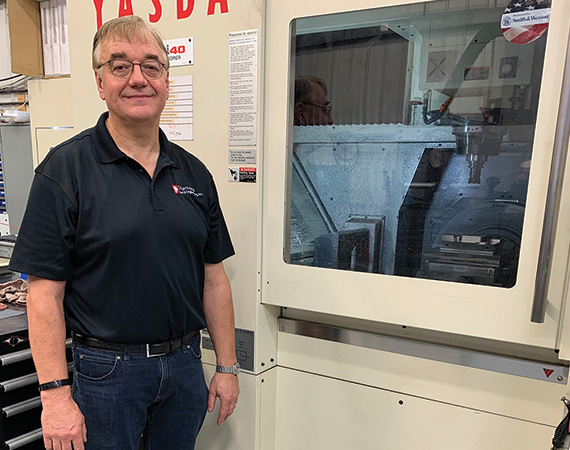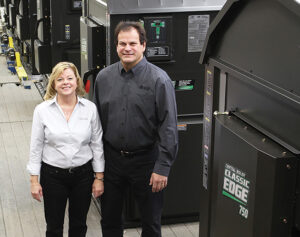One might think a high precision, injection mold manufacturing company would be a modern technology, Silicon Valley upstart. But when it comes to Diamond Tool & Engineering, things aren’t always as they seem. In fact the Bertha, Minn., business had humble beginnings in 1989 as a tool and die company specializing in the injection molding plastics industry. Since then, founder Kent Smith has experienced a long journey to a modern company on the cutting-edge of the latest technology and industry practices.
Smith exhibits his commitment to excellence by investing in the best technology, equipment, and personnel. Over the years, Diamond Tool & Engineering has developed a history of delivering quality molds, fast. From that first rubber mold for Polaris over 30 years ago to automotive molds created through integrated CAD/CAM systems, and to high-precision medical molds, experience and efficiency enable customers to start production quickly, saving time and money.
Much has evolved since 1989, when Smith returned to plant roots in Bertha, the town of his childhood. He sensed the tight-knit community would provide an excellent way to find hard-working and reliable people, which he would pay back by offering rewarding and fulfilling careers. But the business hasn’t always followed a smooth trajectory to success.
The challenges Smith has faced were not unknown to other manufacturers. The bursting dot-com bubble of the late ’90s extracted a 25% drop in revenue. The aftermath of Sept. 11 forced a similar downturn. The Great Recession of 2009 compelled layoffs of nearly 25%, from 35 employees to 26 employees. For a company owner heavily invested in his community, the pain was personal. “It was hard to let go of employees who had become family,” Smith says. “But the work just evaporated.”
Smith says Diamond Tool persevered through a strategy of compartmentalization. To remain viable and competitive, he rotated his automotive tooling to manufacturing plants in China, which enabled the Bertha plant to specialize in intricate, high-precision plastic injection molds for the medical industry.
The combination of low cost overseas tooling and high quality domestic engineering gave Diamond Tool’s customers the best of two worlds, according to Smith.
The company’s resilience also stems from its willingness to think creatively and incorporate new technologies. Smith utilizes the cost-advantages of outsourcing while keeping close oversight and quality control to maintain his company’s reputation for excelling at perfection. The company’s culture encourages spending time up front to design and engineer an injection mold that is of the highest level of integrity and quality, paired with a willingness to look for ways to improve, innovate, and anticipate potential roadblocks. “It seems about every five years you have to redefine yourself to remain viable in today’s market,” Smith says.
Smith attributes some of his success to capturing opportunities that require heavy initial investment but add exponential value in the long term. Cross-training employees and offering them ownership over their roles on the manufacturing floor incentivize the retention of skilled workers. The team becomes an efficient and cohesive collaboration of workers. Smith also invested in robotics and cutting-edge equipment to maximize output with minimum human resources. His skilled workers can program one of his three automation robotic cells to run overnight, utilizing time that doesn’t require human attention. Additionally, Smith’s Toshiba EC140 molding machine gets molds ready for production following the first sampling in 98% of projects. It is this attention to detail and seeking the right investments that set Smith apart.
Like others, Smith’s operation emphasizes lean production processes. By maximizing customer value while minimizing waste, lean processes have a dramatic, positive impact on the functionality of the company, its customers, and the environment. From first becoming ISO 9001:2008 certified to adopting an updated shop management system and working within the framework of Design for Manufacturability/Manufacturing (DFM), Diamond Tool is at the forefront of effectively designing parts and products for easy and efficient production resulting in sustained growth and success. Enterprise Minnesota strategy experts and consultants have made valuable contributions to Diamond’s sustained success. Capitalizing on the Entrepreneurial Operating System and implementing lean processes led to internal problem solving and fine-tuning quality control in the manufacturing facilities.
Enterprise Minnesota, Smith says, has helped integrate the company’s core values into a framework that overcomes challenges and finds new ways to innovate. “We used to train employees by their current skill set. Today, we rely on versatility and cross-training. It makes for a more cohesive workforce. Enterprise Minnesota has been a good partner to help us make a better workplace for everyone.”
…
Featured story in the Fall 2021 issue of Enterprise Minnesota magazine.


